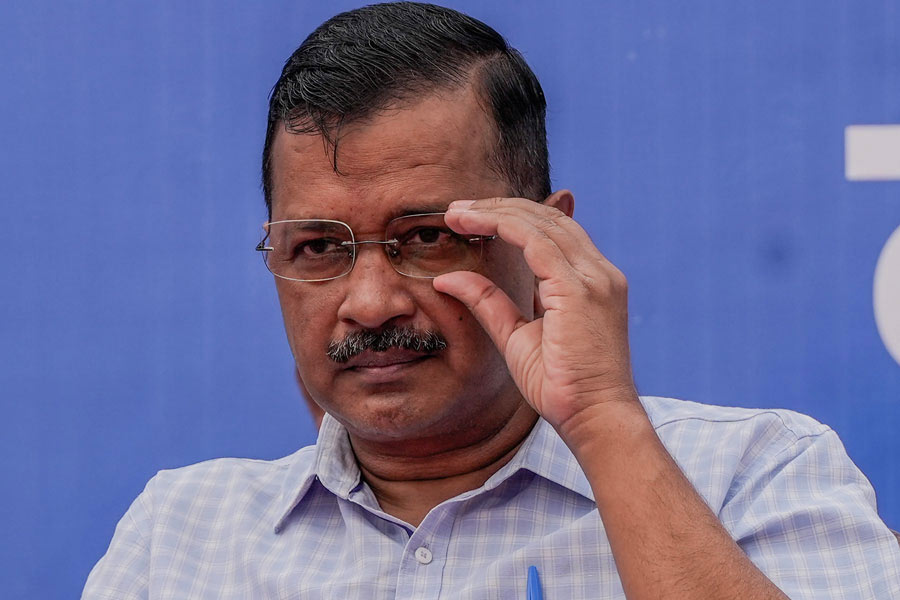The Delhi High Court on Thursday reserved its order on a plea by Chief Minister Arvind Kejriwal, arrested in Delhi excise scam cases, seeking additional virtual meetings with his lawyers, a move both the Enforcement Directorate (ED) and the Tihar jail authorities contested while insisting the law was equal for all.
The AAP leader’s counsel submitted he was facing around 35 cases across the country and, for a fair trial, he required two additional meetings with his lawyers via video conference to discuss the issues.
Opposing Kejriwal's petition, Tihar jail authorities contended there are many prisoners who have 100 cases pending against them and they are allowed only two meetings with their lawyers but are still managing with it.
The Enforcement Directorate (ED) alleged that Kejriwal was using his meetings with lawyers for sending out instructions to the ministers of the Delhi government.
Having heard the contentions of the parties, Justice Neena Bansal Krishna said she was reserving the order which will be passed in chambers.
While opposing Kejriwal's petition, the counsel for the jail authorities said he initially sought only two additional physical meetings with his lawyers and now he wanted two more virtual meetings. The change of mode cannot change the rule which allows a prisoner to have only two meetings with his advocate every week.
The ED’s counsel said similar prayers were made before a division bench of the high court in a public interest litigation but the prayer was rejected. The Delhi prison rules are far more liberal as compared to rules elsewhere in the country, the lawyer said, adding all prisoners in Delhi jails are treated equally and all get to meet their lawyers twice every week.
He said no material fact put forth by Kejriwal demonstrated how the legal meetings and interviews were inadequate.
The lawyer claimed Kejriwal, in one of his statements, had said he was communicating messages to his ministers through his advocates for administrative work.
Countering the submissions, Kejriwal’s counsel said the ED should not have any say in the matter as he was in judicial custody and the prison authorities were the main party to the case.
He added that Kejriwal sent messages to his ministers through his lawyers when he was in police custody and not in judicial custody while lodged in Tihar jail.
Kejriwal has challenged the trial court's July 1 order rejecting his application for directions to the prison authorities to grant him two additional meetings every week with his lawyers through video conference. The jailed Aam Aadmi Party national convener is currently allowed two meetings with his lawyers per week.
The trial court had rejected his plea, saying his counsel had failed to convince the court as to how he was entitled to two additional legal meetings through video conference on the same grounds which have been discussed and dealt with in an earlier order.
In separate petitions, Kejriwal has challenged his arrest in the corruption case registered by the Central Bureau of Investigation (CBI) in connection with the alleged excise policy scam and also sought bail.
The AAP leader was arrested by the CBI on June 26 from Tihar Jail, where he is still lodged in judicial custody in a connected money laundering case filed by the Enforcement Directorate (ED).
Kejriwal, who was arrested by the ED on March 21, was granted bail by the trial court in the money laundering case on June 20. However, the trial court's order was stayed by the high court.
The Supreme Court granted him interim bail on July 12 in the money laundering case till a larger bench considers three questions on the aspect of "need and necessity of arrest" under the Prevention of Money Laundering Act (PMLA).
The excise policy was scrapped in 2022 after the Delhi lieutenant governor ordered a CBI probe into alleged irregularities and corruption involving its formulation and execution.
According to the CBI and the ED, irregularities were committed while modifying the excise policy and undue favours extended to licence holders.
Except for the headline, this story has not been edited by The Telegraph Online staff and has been published from a syndicated feed.










